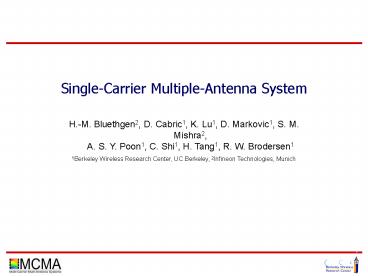Template for MCMA Poster Slides - PowerPoint PPT Presentation
1 / 10
Title:
Template for MCMA Poster Slides
Description:
Random number generators, channel, analog impairments, timing recovery, etc. ... Data source: 4 internal pseudo-random sequence generators. Data rate: 4 x 2 Mbps ... – PowerPoint PPT presentation
Number of Views:22
Avg rating:3.0/5.0
Title: Template for MCMA Poster Slides
1
Single-Carrier Multiple-Antenna System
H.-M. Bluethgen2, D. Cabric1, K. Lu1, D.
Markovic1, S. M. Mishra2,A. S. Y. Poon1, C.
Shi1, H. Tang1, R. W. Brodersen1 1Berkeley
Wireless Research Center, UC Berkeley, 2Infineon
Technologies, Munich
2
Introduction
- Current research activities in MCMA group
include - Real-time emulation of a single-carrier
multi-antenna system (SCMA) based on adaptive SVD
algorithm - Development of a parallel multi-antenna RF
front-end - Goals
- 1. Gain experience on
- System design including baseband and RF
components - Implementation of real-time radios
- 2. Develop a library of communication blocks
- Random number generators, channel, analog
impairments, - timing recovery, etc.
- 3. Get results using BEE as an emulation engine
- BER curves
- Influence of analog impairments
3
SCMA System Overview
Control
First Level of Hierarchy
SimulationControl
Second Level of Hierarchy
4x4-AntennaBaseband-EquivalentChannelModel
DataSource
DataSink
Analog Impairments
Analog Impairments
Phase/Timing Recovery
SVD
SVD
Transmitter
Channel
Receiver
Uplink
4
Specifications
- Data source 4 internal pseudo-random sequence
generators - Data rate 4 x 2 Mbps
- Bandwidth 1 MHz
- Modulation scheme QPSK
- Continuous transmission
- Control of channel coefficients, analog
impairments parameters, SNR, start of
transmission, freeze of simulation,etc. - First implementation with wired uplink
5
Channel Emulation
- Use ray-tracing simulator BWRSim to determine
impulse response between each antenna pair - Extract a single tap for narrowband channel
- Repeat the procedure for each antenna location
- Channel coefficient matrix stored in block RAM
- Input parameter mobile speed
- 18 sec of data for 1 km/hr mobile speed fits on
1 FPGA
6
Singular Value Decomposition (SVD) Based
Multiple-Antenna Processing
- LMS based blind tracking of SVD components U,?,V
- Key building blocks are based on vector
additions and multiplications - Investigate efficient implementation using
time-multiplexing and interleaving - Floating point to fixed point conversion to
ensure minimal hardware cost - Need to identify most efficient training
strategy and optimal feedback rate - Analyze performance in the presence of analog
impairments
7
Analog Impairments
Transmitter impairments Pulse shaping filter
fixed point design D/A non-idealities Power
amplifier model RF filter model
Receiver impairments Frequency offset Phase
noise Low pass filtering Sampling phase jitter
Sampling phase offset I/Q imbalance amplitude
and phase
AWGN model using Cellular Automata Input Bits
precision Noise figure Periodicity gt
1010 Flat spectrum Seed initialized Low hardware
complexity lt1K slices
8
Parallel RF Front-End Overview
SCSI
Riser card
CLK
Scalable up to 16 antennas
Riser card
Control
SCSI
Riser card
9
Single Channel RF Front-End
Reference Design Specifications A/D and D/A
card 12 bits dual DAC _at_ 125Msps 12 bits dual
ADC _at_ 65Msps Clk signal from BEE BEE compatible
SCSI connection
RF front-end Carrier frequency of 2.4 GHz 20 MHz
channel bandwidth Linear PA with output power up
to 10 dBm AGC with gain 0 36 dB LNA gain
control Low phase noise SMA connectors for
antennas
Ref. Sig.
PLL Prog
Q In
I In
Q Out
Ant.
I Out
-5.2 V
GND
5.2 V
3.3 V
10
Future Work
- Complete first version of SCMA system
- Implement new angle-based multiple-antenna
channel model - Extend system to multiple carriers (OFDM)
- Design parallel front-end
- Establish wireless link using parallel front-end

